Suchergebnisse für "Factsheet: Energietechnologien gestalten, die für alle sinnvoll und nutzbar sind"
GREENsChOOLENERGY - Development and practical implementation of sustainable solutions for urban hotspots in combination with greening / PV / water
Use of the synergetic effects in the construction of photovoltaic, greening and irrigation systems at the location of HTL1 Klagenfurt Lastenstraße, to optimize the yield of experimental photovoltaic elements and at the same time reduce urban heat islands.
ESSBAR – Edible balcony gardens for retrofit – Vertical Greening Technologies for the City
Demonstration of an affordable, resource-saving and innovative balcony system with integrated edible vertical gardens and rainwater management. Considering the needs of residents for green outdoor spaces and the active participation of residents are an important part of the project.
PersonAI - User-Centered AI-based energy services built on personal preference models
Conduct a large-scale, long-term study with 40-50 people to create personal comfort profiles to increase comfort in buildings. The personal comfort profiles will then be fed back into the building control system as input variables in a proof-of-concept.
Vilipa - Visible light based Person and Group Detection in existing buildings
Evaluation of the technical and economic feasibility of an occupancy detection system based on the technology of visible light sensing, which, in combination with the building management system, should reduce the energy consumption of buildings. The goal is to implement low-tech/low-complexity solutions that can distinguish between individuals and groups based solely on the detection of visible light reflections.
City of Tomorrow
City of Tomorrow puts emphasis on the built infrastructure in connection with urban energy systems, both on a district-level and within the wider agglomeration (suburban areas).
Cooling Citites
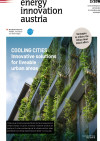
Innovative solutions for liveable urban areas
energy innovation austria
2/2019
Herausgeber: BMVIT und Klima- und Energiefonds
Englisch, 12 Seiten
Downloads zur Publikation
CELL4LIFE - Reversible SOCs as a link between electricity, heat and gas networks to increase the self-sufficiency and resilience of neighbourhoods
A system consisting of a solid oxide fuel cell and a Machine Learning-based control system for increasing efficiency and minimizing degradation is being developed. As a link between all energy supply networks, the system is intended to increase the self-sufficiency and resilience of plus-energy districts.
INN'FIT4UM - Innsbruck "Fit4UrbanMission" - climate neutral Innsbruck 2030
Cities are the place where decarbonization strategies for energy, transport and buildings intersect. A few years ago, the municipality of Innsbruck set up a Smart City Group consisting of staff from the municipality, IIG, IKB and IVB to address this challenge. The goal of INN'F4UM is to develop a step-by-step plan to achieve climate neutrality for the city by 2030, building on an up-to-date representation of energy and resource flows together with the University of Innsbruck.
Renewable Heating and Cooling
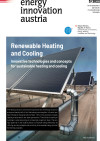
Innovative technologies and concepts for sustainable heating and cooling
energy innovation austria
3/2022
Herausgeber: BMK in cooperation with the Climate and Energy Fund
Englisch, 12 Seiten
Downloads zur Publikation
FiTNeS - Facade integrated modular Split-heat pump for new buildings and refurbishment
The goal of FitNeS was the development of modular split heat pumps with compact and silent façade-integrated outdoor units for heating and domestic hot water preparation (and optionally cooling in combination with PV). The outstanding features of the concept are a modular design with a high degree of prefabrication and representing a visually and architectonically attractive, economic and sustainable solution for both new constructions and renovations. One of the main development goals is the minimization of sound emissions by means of optimized flow control.
Reallabor Weizplus - Reallabor climate-neutral region Weizplus
Clarification of relevant questions for the potential establishment of a real lab in the region of Weizplus, which aims at a 100% supply of the region with renewable energies by 2030. The content-related technological focus of the activities of the future real lab is on all energy-relevant sectors (heating, electricity, cooling) applied to the focal points of energy efficiency and replacement of fossil energy in buildings, in trade and industry as well as mobility.
EM Städte - Monitoring and evaluation of urban energy flows
In the first phase of the project, the data source of the energy statistics will be analyzed. Based on the findings of the analysis a methodology on build up regional energy balances will be developed. The methodology will be integrated into the Senflusk tool and tested on five reference cities in Austria.
DIM4Energy - Digital Information Models for the Planning and Optimization of Buildings and Urban Energy Infrastructure
Digital information models (DIM) are playing an increasingly important role in urban planning and decision-making processes, from individual buildings (BIM) to urban information models (UIM). For the planning and optimal operation of plus-energy neighborhoods, valuable information could be obtained from these existing models, provided the appropriate data sources and associated software tools are properly linked.
CO2 neuBau - The CO2-neutral Construction Site: a Contribution to the Climate Protection by the Austrian Construction Industry
Identification of all direct and indirect CO2, respectively, GHG emissions generated at construction sites. Analysis of the framework conditions and technologies towards demonstrating the options for their control. In parallel, added values, such as cost-benefit advantages of a CO2-neutral construction site, were outlined and quantified.
F4WM - Fit4WienerMission
Preparation for the EU Urban Mission by updating goals and strategies (Smart City Wien Framework strategy, Climate-Roadmap), developing a manual for climate-neutral Viennese neighbourhoods and concepts for the participation of citizens (Climate Citizens' Council) and businesses (Climate Agreements), as well as a city-internal capacity and structural planning.
South Burgenland Innovation Cluster
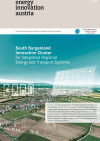
South Burgenland Innovation Cluster for Integrated Regional Energy and Transport Systems
energy innovation austria
1/2019
Herausgeber: BMVIT und Klima- und Energiefonds
Mehrsprachig, 8 Seiten
Downloads zur Publikation
Innovations for cool urban oases
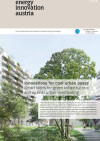
Smart ideas for green infrastructure and against urban overheating
energy innovation austria
3/2018
Herausgeber: BMVIT und Klima- und Energiefonds
Englisch, 8 Seiten
Downloads zur Publikation
Digitization in the construction industry
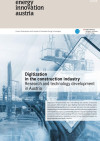
Research and technology development in Austria
energy innovation austria
4/2018
Herausgeber: BMVIT und Klima- und Energiefonds
Englisch, 8 Seiten
Downloads zur Publikation
KlimaStadtLinz2030: Linz and its path to climate neutrality by 2030 - Preparation for the EU - Mission “100 Climate-neutral Cities by 2030”
The research project investigates whether and how it is possible for the city of Linz to achieve climate neutrality by 2030 within its own sphere of influence. A common vision, which is being developed with the citizens in a participatory manner, unites the opportunities that arise for the city through the measures necessary for this goal.
CoolAIR - Predictive control of natural nighttime ventilation and daylight-optimized shading for passive building cooling
Natural nighttime ventilation and daylight-optimized shadowing are high potential approaches to efficiently and economical cool buildings. Nevertheless, the full potential cannot be acquired, since, if at all, such behavior is manually initiated by users. Goal of this project is the development of an automated, self-learning system that can assess the full cooling capabilities and establish an alternative to conventional air conditioning systems.
